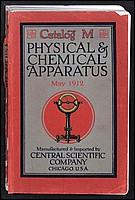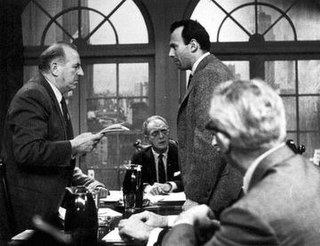
A Petri dish is a shallow transparent lidded dish that biologists use to culture cells, such as bacteria, or small mosses. It is the most common type of culture plate.

A library catalog is a register of all bibliographic items found in a library or group of libraries, such as a network of libraries at several locations. A bibliographic item can be any information entity that is considered library material, or a group of library materials, or linked from the catalog as far as it is relevant to the catalog and to the users (patrons) of the library.

A stamp catalog is a catalog of postage stamp types with descriptions and prices.
An online public access catalog is an online database of materials held by a library or group of libraries. Users search in library catalog principally to locate books and other material available at a library. In simple language it is an electronic version of the card catalog. OPAC is the gateway to library's collection.
Online Mendelian Inheritance in Man (OMIM) is a continuously updated catalog of human genes and genetic disorders and traits, with a particular focus on the gene-phenotype relationship. As of 28 June 2019, approximately 9,000 of the over 25,000 entries in OMIM represented phenotypes; the rest represented genes, many of which were related to known phenotypes.

OCLC, Inc., doing business as OCLC, is an American nonprofit cooperative organization "dedicated to the public purposes of furthering access to the world's information and reducing information costs". It was founded in 1967 as the Ohio College Library Center, then became the Online Computer Library Center as it expanded. In 2017, the name was formally changed to OCLC, Inc. OCLC and its member libraries cooperatively produce and maintain WorldCat, the largest online public access catalog (OPAC) in the world. OCLC is funded mainly by the fees that libraries have to pay for its services. OCLC also maintains the Dewey Decimal Classification system.

Anglo-American Cataloguing Rules (AACR) were an international library cataloging standard. First published in 1967 and edited by C. Sumner Spalding, a second edition (AACR2) edited by Michael Gorman and Paul W. Winkler was issued in 1978, with subsequent revisions (AACR2R) appearing in 1988 and 1998; all updates ceased in 2005.

WorldCat is a union catalog that itemizes the collections of 17,900 libraries in 123 countries and territories that participate in the Online Computer Library Center (OCLC) global cooperative. It is operated by OCLC, Inc. The subscribing member libraries collectively maintain WorldCat's database, the world's largest bibliographic database. OCLC makes WorldCat itself available free to libraries, but the catalog is the foundation for other subscription OCLC services. WorldCat is used by the general public and by librarians for cataloging and research.

Mail order is the buying of goods or services by mail delivery. The buyer places an order for the desired products with the merchant through some remote method such as:
The Bright Star Catalogue, also known as the Yale Catalogue of Bright Stars, Yale Bright Star Catalogue, or just YBS, is a star catalogue that lists all stars of stellar magnitude 6.5 or brighter, which is roughly every star visible to the naked eye from Earth. The catalog lists 9,110 objects, of which 9,095 are stars, 11 are novae or supernovae, and 4 are non-stellar objects which are the globular clusters 47 Tucanae and NGC 2808 (HR 3671), and the open clusters NGC 2281 (HR 2496) and Messier 67 (HR 3515).

Kraft Television Theatre is an American drama/anthology television series that began May 7, 1947, on NBC, airing at 7:30pm on Wednesday evenings until December of that year. It first promoted MacLaren's Imperial Cheese, which was advertised nowhere else. In January 1948, it moved to 9pm on Wednesdays, continuing in that timeslot until 1958. Initially produced by the J. Walter Thompson advertising agency, the live hour-long series offered television plays with new stories and new characters each week, in addition to adaptations of such classics as A Christmas Carol and Alice in Wonderland. The program was broadcast live from Studio 8-H at 30 Rockefeller Plaza, currently the home of Saturday Night Live.
LibraryThing is a social cataloging web application for storing and sharing book catalogs and various types of book metadata. It is used by authors, individuals, libraries, and publishers.
Grammofonleverantörernas förening (GLF), or the Swedish Recording Industry Association in English, is an organization representing the music recording industry of Sweden. It has compiled and published the official record charts for the Swedish music recording industry since 1975, including the Swedish Albums Chart and Swedish Singles Chart.
The International Designator, also known as COSPAR ID, and NSSDC ID, is an international identifier assigned to man-made objects in space. It consists of the launch year, a three-digit incrementing launch number of that year and up to a three-letter code representing the sequential identifier of a piece in a launch. In TLE format the first two digits of the year and the dash are dropped.
In museums and archives, the collection of objects or material is normally catalogued in a collection catalog. Traditionally this was done using a card index, but nowadays it is normally implemented using a computerized database and may even be made available online.
The AFI Catalog of Feature Films, also known as the AFI Catalog is an ongoing project by the American Film Institute to catalog all commercially made and theatrically exhibited American motion pictures, from the earliest days of the industry to the present. It began as a series of hardcover books known as The American Film Institute Catalog of Motion Pictures, and subsequently became an online database exclusively.
"Liza " is a song composed by George Gershwin with lyrics by Ira Gershwin and Gus Kahn. It was introduced in 1929 by Ruby Keeler in Florenz Ziegfeld's musical Show Girl. The stage performances were accompanied by the Duke Ellington Orchestra. On the show's opening night in Boston on June 25, 1929, Keeler's husband and popular singer Al Jolson suddenly stood up from his seat in the third row and sang a chorus of the song, much to the surprise of the audience and Gershwin himself. Jolson recorded the song a few days later on July 6, 1929, and his rendition rose to number nine on the charts of the day.
Academic Search is a monthly indexing service. It was first published in 1997 by EBSCO Publishing in Ipswich, Massachusetts. Its academic focus is international universities, covering social science, education, psychology, and other subjects. Publishing formats covered are academic journals, magazines, newspapers, and CD-ROM.

The Thomas J. Watson Library is the main research library of the Metropolitan Museum of Art (MMA), and supports the research activities of the museum staff, as well as outside researchers.
The World Spider Catalog (WSC) is an online searchable database concerned with spider taxonomy. It aims to list all accepted families, genera and species, as well as provide access to the related taxonomic literature. The WSC began as a series of individual web pages in 2000, created by Norman I. Platnick of the American Museum of Natural History. After Platnick's retirement in 2014, the Natural History Museum of Bern (Switzerland) took over the catalog, converting it to a relational database.








